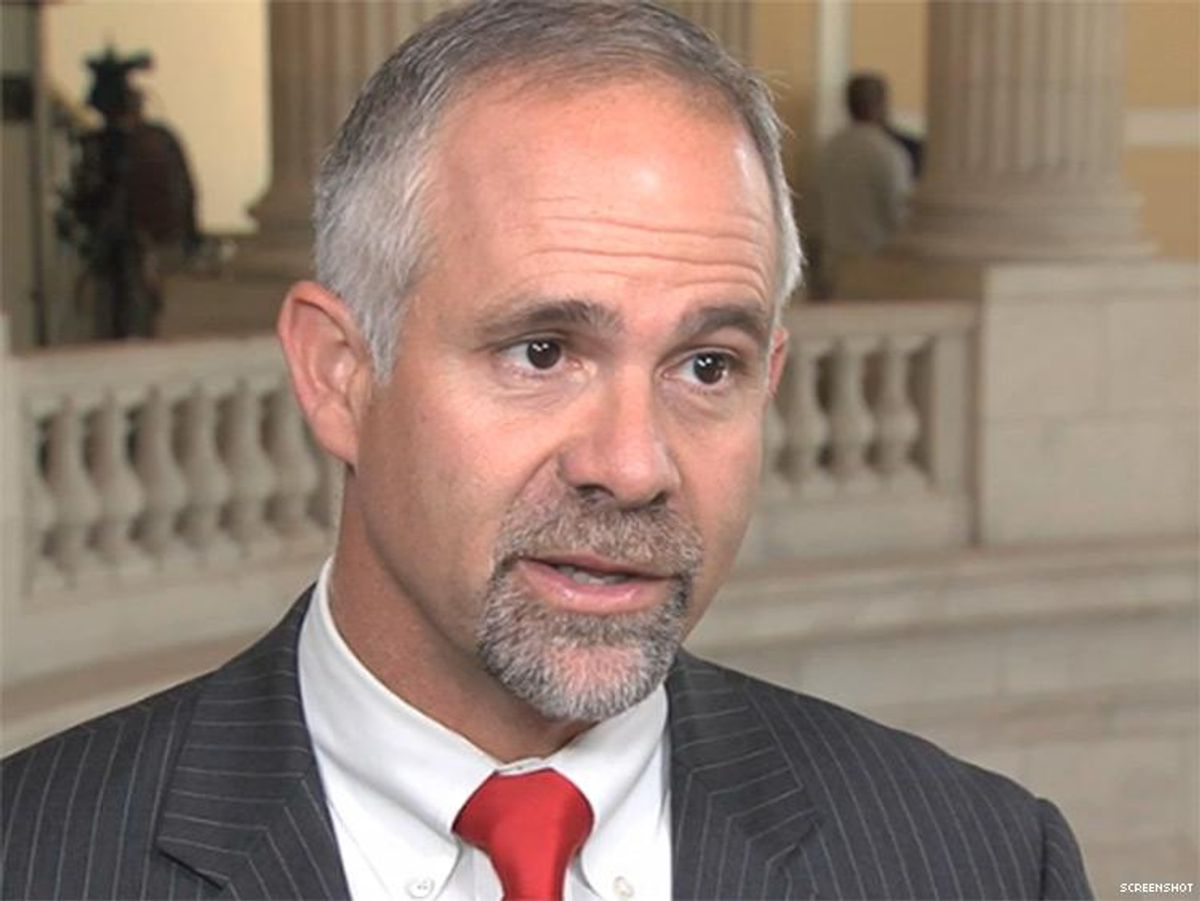A Kansas Republican whose congressional career was marked by dogged opposition to marriage equality won't be returning to Washington next year.
Tim Huelskamp, a three-term congressman representing Kansas's First Congressional District, lost his primary election Tuesday, reports The Wichita Eagle. But the newcomer who defeated Huelskamp, obstetrician Roger Marshall, tracks closely with the firebrand conservative on many issues. Marshall won Tuesday's primary with 57 percent of the vote, compared to Huelskamp's 43 percent, the Eagle reports.
Huelskamp made no secret of his opposition to marriage equality, and apparently maintained that confrontational tone throughout his tenure in Congress, the local paper reports. As early as 2012, the Tea Party favorite from Kansas had distinguished himself as one of the most antigay members of the U.S. House of Representatives, according to ThinkProgress.
Indeed, Huelskamp was a frequent speaker at anti-marriage equality rallies organized by the National Organization for Marriage, including a protest outside the U.S. Supreme Court in April 2015, on the day the high court heard oral arguments in Obergefell v. Hodges, the landmark case that would bring marriage equality to all 50 states.
At that rally, Huelskamp had to shout into the microphone to be heard over pro-equality protesters chanting "Love will win," but he still managed to deride the idea of marriage equality as "an act of legal fiction," claiming that equality supporters were only seeking relief through the courts because "they cannot win in the states, they cannot win our hearts." At the time he gave that speech, 36 U.S. states had already embraced marriage equality, and a solid majority of American voters supported the same.
In fact, Huelskamp made a habit out of attempting to sidestep pro-equality Supreme Court rulings. After the high court struck down a key section of the so-called Defense of Marriage Act in 2013's Windsor v U.S., the Kansas representative introduced a bill that sought to amend the U.S. Constitution to ban same-sex marriage. As he explained at the time, Huelskamp hoped his amendment would bar any state in the U.S. from granting marriage licenses to same-sex couples. That bill suffered the same fate that similar efforts had in years prior and since, failing to obtain the necessary two-thirds majority in both chambers of Congress to advance.
But marriage equality opposition wasn't Huelskamp's only antigay cause celebre. He was also a staunch opponent of equal treatment for gay, lesbian, and bisexual service members and veterans. In 2014, he hewed to the party line in voting against extending spousal benefits to the legal same-sex partners of veterans. In February 2013, Huelskamp introduced a bill known as the Military Religious Freedom Protection Act, which sought to protect antigay service members, chaplains, and other members of the armed forces from punishment if and when they acted upon their "sincerely held religious or moral belief" that marriage should only exist between one man and one woman. The bill, which died in committee, included a specific exemption for military chaplains, ensuring that they would not be "directed, ordered, or required to perform any duty, rite, ritual, ceremony, service, or function (ceremony) that is contrary to the conscience, moral principles, or religious beliefs (beliefs) of the chaplain or the chaplain's faith group," according to the text of the bill.
While Huelskamp won't be clogging the halls of Congress with his unabashed antigay agenda, it's unclear whether the Republican who defeated him in Tuesday's primary would be any friendlier to LGBT people. The Republican rivals hold similar views on many of the key issues they each campaigned on, including opposing the Affordable Care Act (also known as "Obamacare"), opposing legal abortion, and being avid supporters of the Second Amendment, notes the Eagle.
Marshall's campaign website proudly proclaims that the ob-gyn is "not a politician," which makes it difficult to ascertain where his views fall on issues of LGBT equality. A search of the candidate's Facebook page revealed no mention of marriage equality, nondiscrimination protections, or other issues important to LGBT voters. His campaign appears to have heavily targeted farmers, ranchers, and medical professionals who share Marshall's "conservative Kansas values."
Marshall is adamantly against abortion rights, calling abortion an "awful procedure" and stating on his campaign site that the doctor "will oppose any efforts to ever use taxpayer funding for abortions." His site prominently mentions that Marshall trained at medical schools that refused to teach abortion procedures and did his residency at hospitals that likewise refused to provide such services.
Marshall's campaign site bemoans the Affordable Care Act as "the most egregious example of government interfering in the delivery of health care," and pledges that the doctor, with 25 years of experience, "is committed to using his extensive medical background to repeal Obamacare and will fight to return health care to a system that is controlled by families, patients, and doctors -- not Washington D.C."
Other key issues discussed on Marshall's website include the Second Amendment and "national defense," which the candidate says includes "spending the resources necessary to secure our southern border," and fighting "Radical Islam." Marshall goes on to blast the Environmental Protection Agency, saying that shrinking the influence of the federal agency "is among the top concerns." He also discusses the Kansas economy, which has seen a severe depression under right-wing Gov. Sam Brownback, arguing that excessive regulation has resulted in the state's economic woes.
In November's general election, Marshall is likely to face independent Alan LaPolice (whose platform also wholly ignores explicit LGBT issues), and Libertarian Kerry Burt, who does not appear to have a campaign website. There are no registered Democrats on the ballot for Kansas's First District seat.



















































































